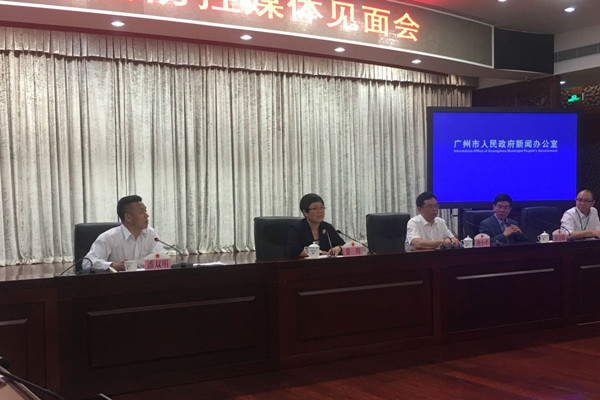More throat-swabbing centers open in Guangzhou

Li Ming, deputy mayor of Guangzhou, second from left, said her city has expanded screening to help find the city's COVID-19 patients. [Photo by Zheng Caixiong/chinadaily.com.cn]
Li Ming, vice-mayor of Guangdong's provincial capital in South China, urged residents not to panic when they discover a growing number of throat-swabbing centers in local communities and housing estates.
Guangzhou has expanded screening to find COVID-19 patients and their close contacts, with an aim to find all the patients, particularly those who have no symptoms, to prevent and control the spread of coronavirus in the city, Li said at a press conference on April 20 evening.
"Now a large number of residents will be screened once a confirmed case has been reported in the city," Li said.
She added that the people who are screened and required to have their nucleic acid tested include a patient's colleagues, people in the same trade, family members, relatives, friends, neighbors and clients.
All of the city's more than 35,000 taxi drivers have now been required to have their nucleic acid tested after a taxi driver was detected with a COVID-19 patient last week. All residents in a housing estate in Guangzhou's Yuexiu district also have been required to have their nucleic acid tested when a resident in the housing estate was confirmed with the virus last week, said Li.
And this is why many throat-swabbing centers have been seen in the city recently, she added.
Li said more than 200,000 teachers, educational staff and grade three students at junior and senior high schools will be required to have the nucleic acid tests before they resume class next week.
Guangzhou can now help more than 70,000 residents a day take nucleic acid tests, according Li.
But the expanded screening on suspected cases did not mean the city has a very high risk of a COVID-19 outbreak, and the city is very safe, she said.
Only seven asymptomatic coronavirus carriers were detected after more than 68,000 residents had been screened over the weekend, and the positive rate reached only 1.32 out of more than 10,000 residents.
"It is very low," she added.
Tang Xiaoping, director of the Guangzhou City Health Commission, said the result of the nucleic acid testing for the city's taxi drivers is quite pleasing, as of Monday noon, all nucleic acid test results of more than 11,300 taxi drivers were negative.
Pan Shuangming, director of the Guangzhou Transportation Bureau, said the city's underground trains, public buses and ferries are safe and residents do not have to worry about being infected with COVID-19 when they take the city's public transportation.
"None of the locals and tourists have, so far, been reported to be infected after taking the city's metro trains, buses and ferries," he said.
And Pan's bureau has enhanced disinfection on public transportation, metro stations and bus terminals, with emphasis disinfection on handrails, lifts, seats and toilets, he added.
